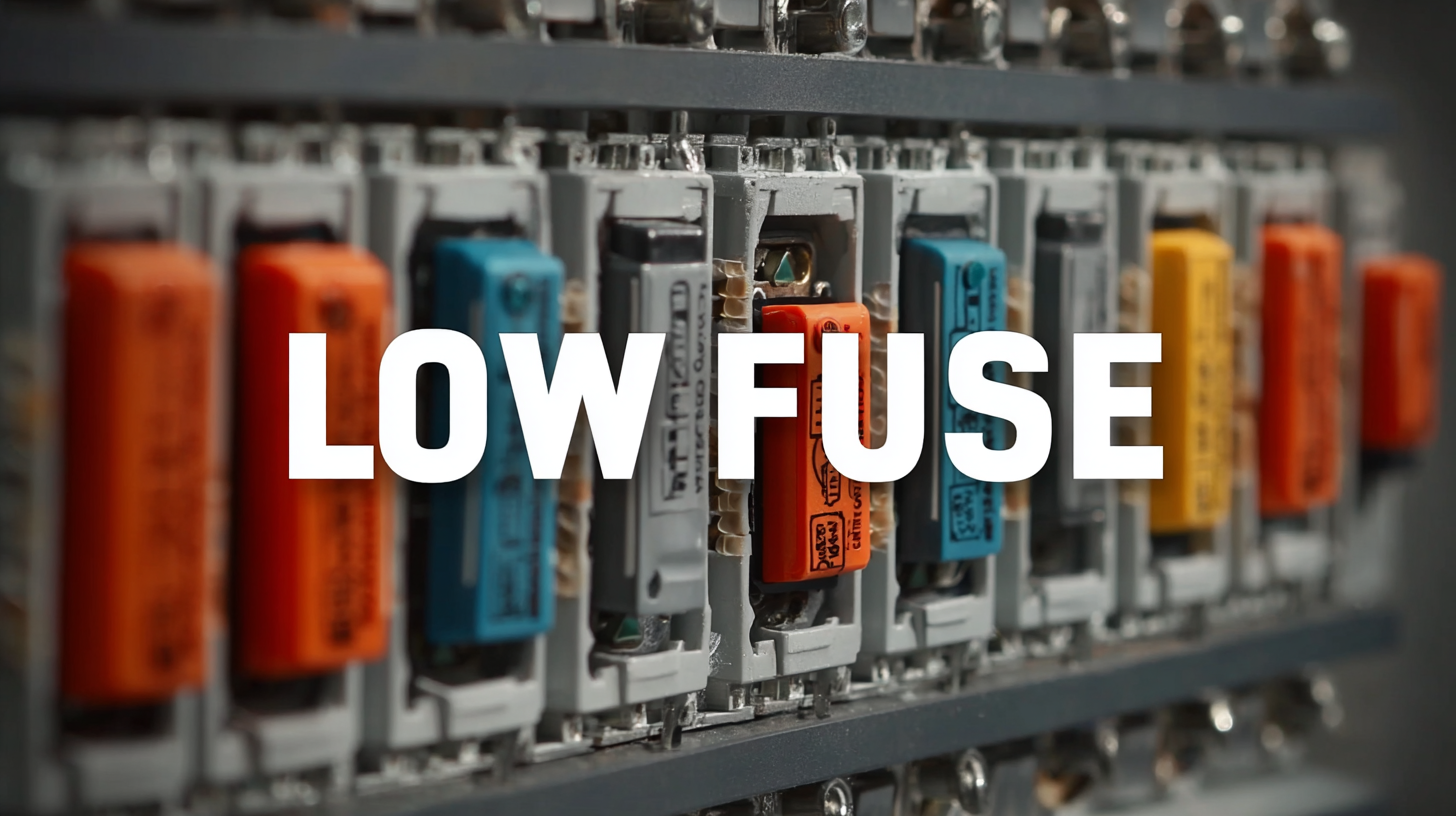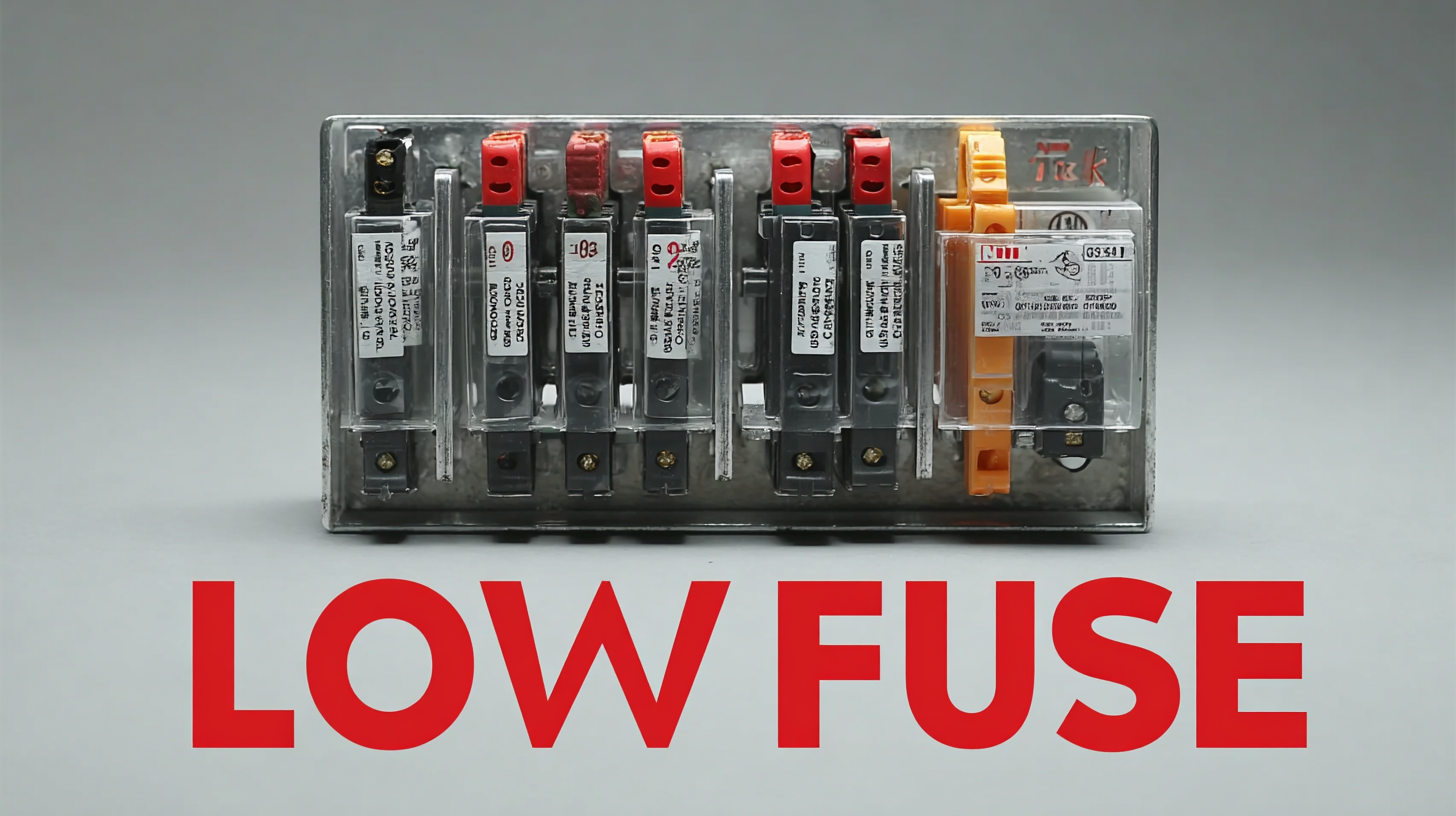
-
Home
-
About Us
-
Products
-
News
-
Blog
-
Contact Us
Leave Your Message

In today's competitive landscape, the procurement of low voltage fuses has become increasingly complex, necessitating a keen understanding of both manufacturing solutions and industry certifications. According to a report by MarketsandMarkets, the low voltage fuse market is projected to reach USD 6.8 billion by 2026, growing at a CAGR of 5.2% from 2021. This growth is driven by the rising demand for safety measures in electrical systems and the technological advancements in fuse designs. To navigate this evolving market effectively, businesses must prioritize manufacturers who not only offer high-quality products but also possess the necessary import and export certifications. These certifications ensure compliance with global standards and enhance supply chain reliability, ultimately influencing procurement decisions. As industry players seek to optimize their supply chains, understanding how to select the right manufacturer solutions for low voltage fuse procurement is crucial.

 When selecting low voltage fuse manufacturers, it's essential to identify key factors that can significantly impact your procurement process. One of the foremost considerations is the manufacturer's reputation for quality and reliability. Brands with a long-standing history in the industry often offer products that meet stringent safety and performance standards. Take time to research certifications and customer reviews, as they reflect the manufacturer's commitment to excellence.
When selecting low voltage fuse manufacturers, it's essential to identify key factors that can significantly impact your procurement process. One of the foremost considerations is the manufacturer's reputation for quality and reliability. Brands with a long-standing history in the industry often offer products that meet stringent safety and performance standards. Take time to research certifications and customer reviews, as they reflect the manufacturer's commitment to excellence.
Another critical factor is the range of products offered by the manufacturer. A diverse product line ensures that you have access to the latest technologies and fuse types that suit your specific needs. It's advisable to choose a manufacturer that invests in research and development, as this indicates they are keeping pace with industry advancements.
Tips: Always inquire about the manufacturer's customer support and service capabilities. A responsive support team can make a significant difference when you encounter issues. Additionally, consider the lead times for delivery, as timely procurement can streamline your operations and reduce downtime in a competitive market. Ensuring that your chosen manufacturer aligns with these factors will lead to more efficient and effective procurement of low voltage fuses.
In the realm of low voltage fuse procurement, understanding industry standards and regulations is crucial for manufacturers and suppliers aiming to remain competitive. The various standards set forth by organizations ensure that fuses meet safety, reliability, and performance requirements, thereby protecting both the end users and the electrical systems they serve. Familiarity with these regulations not only helps manufacturers align their products with market expectations but also facilitates smoother procurement processes.
As the market evolves, particularly in sectors such as defense and aerospace, staying updated with changing procurement regulations is essential. Industry groups are advocating for streamlined regulations, which could open doors for innovative manufacturing solutions and efficiency improvements. This shift can significantly impact how manufacturers approach procurement strategies, making it vital for them to navigate the regulatory landscape adeptly. By integrating compliance with industry standards into their procurement processes, companies can position themselves favorably in an increasingly competitive market.
When selecting a manufacturer for low voltage fuses, evaluating their reputation is crucial in a competitive market. A well-established manufacturer often has proven experience and a track record of reliability. Checking customer reviews and industry feedback can provide insights into their performance and reliability. Moreover, understanding their market presence can indicate their ability to innovate and adapt to changing demands, ensuring that their products meet current standards.
Quality assurance processes are equally important in this procurement phase. A manufacturer should have comprehensive quality control measures in place, including regular testing and adherence to industry standards. Certifications, such as ISO 9001, can indicate a commitment to quality and consistency in production. It's beneficial to inquire about their materials sourcing and testing procedures to ensure that their low voltage fuses are reliable and safe for use. By prioritizing manufacturers who emphasize reputation and robust quality assurance practices, procurement decisions can lead to long-term satisfaction and operational efficiency.
| Manufacturer ID | Reputation Score | Quality Assurance Certification | Warranty Period (Years) | Customer Feedback Rating |
|---|---|---|---|---|
| MFG001 | 88 | ISO 9001 | 5 | 4.5 |
| MFG002 | 91 | UL Listed | 7 | 4.8 |
| MFG003 | 85 | ISO 14001 | 3 | 4.2 |
| MFG004 | 92 | BSI Certified | 6 | 4.7 |
| MFG005 | 78 | CE Marked | 4 | 3.9 |
In today's competitive marketplace, selecting the right manufacturer for low voltage fuses goes beyond evaluating product specifications; it also requires a keen understanding of pricing strategies and value for money in supplier contracts. Suppliers often employ various pricing strategies, such as cost-plus pricing or market-oriented pricing, which can significantly impact your overall procurement costs. Understanding these methodologies can help organizations negotiate better deals and avoid hidden costs that might arise later in the supply chain.
Moreover, the concept of value for money stretches beyond the initial price tag attached to low voltage fuses. Companies must consider factors such as product reliability, warranty offers, and after-sales support. A cheaper option may seem appealing, but if it lacks longevity or quality, it could lead to higher replacement costs and downtime. Consequently, it is essential to have a holistic view when assessing supplier contracts, enabling procurement teams to make informed decisions that enhance both performance and cost efficiency in the long run.
This chart illustrates the price comparison and perceived value for money among different supplier contracts for low voltage fuses.
 Building robust relationships with low voltage fuse suppliers is essential for ensuring a smooth procurement process, especially in a competitive market. One effective strategy is to maintain open lines of communication. Regularly engaging with suppliers through meetings or updates not only keeps them informed about your needs but also fosters trust. When suppliers feel valued and understood, they are more likely to prioritize your orders and provide better service, including timely deliveries and updates on the latest product innovations.
Building robust relationships with low voltage fuse suppliers is essential for ensuring a smooth procurement process, especially in a competitive market. One effective strategy is to maintain open lines of communication. Regularly engaging with suppliers through meetings or updates not only keeps them informed about your needs but also fosters trust. When suppliers feel valued and understood, they are more likely to prioritize your orders and provide better service, including timely deliveries and updates on the latest product innovations.
Another important aspect of strengthening supplier relationships is collaboration. Working together on projects or seeking their input on your product requirements can create a sense of partnership. This collaborative approach enhances mutual understanding and allows suppliers to tailor their offerings to better meet your specific needs. Additionally, providing feedback and acknowledging their efforts can further solidify the relationship, as suppliers appreciate recognition and are motivated to enhance their performance in response.